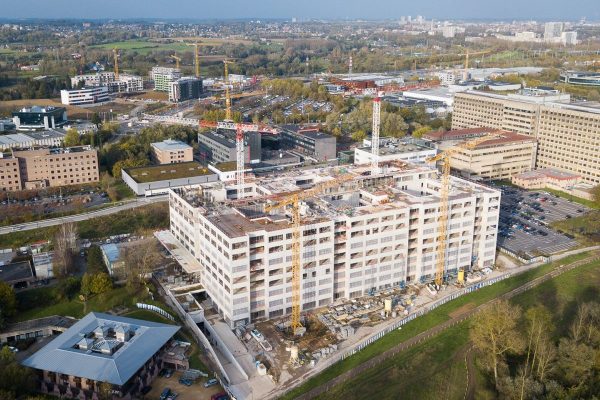
Results of the phase III RAPIDO trial identify a short-course radiotherapy (5×5 Gy over 8 days) followed by either 6 cycles of CAPOX or 9 cycles of FOLFOX4 and a total mesorectal excision (TME) as a new standard of care for patients with locally advanced rectal cancer. Compared to the current standard of care, this new strategy proved to be associated with a significant reduction in the rate of treatment failure with a pronounced effect on the incidence of distant metastases. On the flip side, the higher toxicity of this regimen does limit its applicability to fitter patients.

‘Patients were treated with a short-course of radiotherapy (5×5 Gy over maximum 8 days) followed by six cycles of CAPOX or nine cycles of FOLFOX4, followed by a total mesorectal excision (TME), compared to standard 28 daily fractions of radiotherapy with concomitant capecitabine followed by TME and adjuvant chemotherapy with eight cycles of CAPOX or 12 cycles of FOLFOX4.’
‘At three years, the cumulative probability of failure was 23.7% in the experimental group versus 30.4% in the standard treated patients (significant HR 0.75) with a doubling of the pCR rate. The difference between both strategies was most prominent in the incidence of distant metastases which were seen in 20.0% of patients in the experimental group compared with 26.8% in the standard of care group (significant HR 0.69). More patients with a pCR might benefit from organ-sparing approach. However, the grade 3 toxicity (diarrhea) was twice as much in the experimental arm. As such, a shorter radiotherapy schedule with longer neoadjuvant chemotherapy should be considered as the new standard approach for high-risk, locally advanced rectal cancer because of the increased efficacy. However, the strategy should be restricted to patients with an ECOG of 0-1 (an overwhelming majority of patients in the study was ECOG 0), good renal function and not applied in frail patients because of the higher toxicity.’
The standard-of-care (SoC) for locally advanced rectal cancer consists of chemoradiotherapy, followed by total mesorectal excision. Despite this, the rate of distant recurrences remains relatively constant. The Stockholm III trial has previously determined that surgery can be safely delayed following short-course radiotherapy, allowing for a window of opportunity to administer pre-operative chemotherapy. To evaluate this strategy, the multicentre phase III RAPIDO trial randomised 912 patients with high-risk, primary locally advanced rectal adenocarcinoma to receive short-course radiotherapy (5×5 Gy over 8 days) followed by either 6 cycles of CAPOX or 9 cycles of FOLFOX4 and total mesorectal excision (TME) (experimental group), or standard, 28-day fraction radiotherapy in combination with capecitabine followed by TME (SoC group), as well as 8 cycles of CAPOX or 12 cycles of FOLFOX4, if indicated by local hospital policy.
The median age of patients in the study was 62 years, two-thirds were male and approximately 65% of participants had a grade 3 clinical tumour staging. Overall, 59% of patients in both treatment arms received adjuvant chemotherapy, according to local hospital policy. At a median follow-up of 4.6 years, the 3-year rate of treatment failure was reported at 23.7% and 30.4% for the experimental and SoC groups, respectively (HR[95%CI]: 0.75[0.60-0.95], P= 0.019). In subsequent subgroup analyses the 3-year treatment failure was consistently in favour of the experimental treatment regimen. These results translated in a lower cumulative probability of distant metastases of 20.0% and 26.8%, respectively (HR[95%CI]: 0.69[0.54-0.90], P= 0.0048). The rate of pCR was also higher in the experimental arm (28% vs. 14%; OR[95%CI]: 2.37[1.67-3.37], P< 0.0001). Also the 3-year OS rate favoured the experimental arm, but for this endpoint the difference did not cross the threshold for statistical significance (89.1% vs. 88.8%; HR[95%CI]: 0.92[0.67-1.25], P= 0.59). Finally, the rate of R0 resections was reported at 90% in both groups.
The most common grade ≥3 adverse events (AEs) during preoperative therapy in both groups were diarrhoea (18% experimental arm, 9% SoC arm) and neurological toxicity during adjuvant chemotherapy in the SoC group (9%). Serious AEs occurred in 38% of experimental group patients and 34% in SoC patients both with and without adjuvant chemotherapy. In both treatment arms, 3% of treatment related deaths occurred.
Reference
Bahadoer R, et al. Short-course radiotherapy followed by chemotherapy before total mesorectal excision (TME) versus preoperative chemoradiotherapy, TME, and optional adjuvant chemotherapy in locally advanced rectal cancer (RAPIDO): a randomized, open-label, phase 3 trial. Lancet Oncol. 2021 Jan;22(1):29-42.